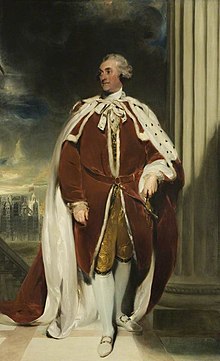William Cavendish-Bentinck, 3rd Duke of Portland
Appearance

William Henry Cavendish Cavendish-Bentinck, 3rd Duke of Portland KG PC FRS (14 April 1738 – 30 October 1809) was a British Whig and then a Tory politician during the late Georgian era. He served as Chancellor of the University of Oxford (1792–1809) and as Prime Minister of Great Britain (1783) and then of the United Kingdom (1807–1809). The gap of 26 years between his two terms as Prime Minister is the longest of any British Prime Minister.
Quotes
[edit]- The part which we had to act was unavoidable, and he had no hesitation in saying, that he should give his firm support to a war, the object of which was, to resist doctrines that, in his opinion, went to the overthrow, not merely of all legitimate government, of the security of nations, of peace and order, but even of religion itself, and of every thing for which society was instituted. He pledged himself, therefore, to the support of the war into which we were plunged; declaring, at the same time, that he should not consider this as tending to prevent him from inquiring: scrupulously into the conduct of ministers in the way in which they should carry it on.
- Speech in the House of Lords upon the outbreak of war with France (12 February 1793), quoted in The Parliamentary History of England from the Earliest Period to the Year 1803, Vol. XXX. Comprising the Period from the Thirteenth of December 1792, to the Tenth of March 1794 (1817), column 413
- As to what might be the power of the enemy, it was not, he thought, a question upon which they could now deliberate. If they were in the very zenith of their power, and attempted by the same means to propagate the same doctrines, he would be ready to incur all the dangers of the war; for he thought that we never were engaged in a war, upon the issue of which the very existence of the government of this country was so much at stake.
- Speech in the House of Lords upon the outbreak of war with France (12 February 1793), quoted in The Parliamentary History of England from the Earliest Period to the Year 1803, Vol. XXX. Comprising the Period from the Thirteenth of December 1792, to the Tenth of March 1794 (1817), columns 413-414
Quotes about the Duke of Portland
[edit]- The King...said...[he] thought the Duke of Portland weak and of no use, and that he was governed by the Bishop of Meath, who was an unsound man.—This is curious.
- Mr. Cooke to Lord Castlereagh on Castlereagh's plan of subsidising the Catholic Church in Ireland, and making it a state church as well as the Protestant Church of Ireland, which the Duke of Portland supported (20 March 1801), quoted in Memoirs and Correspondence of Viscount Castlereagh, Second Marquess of Londonderry, Vol. IV, ed. Charles Vane, Marquess of Londonderry (1849), p. 81
- The Duke of Portland waves the chancellorship of the duchy, and agrees to remain in the cabinet without office. Nothing could be kinder or handsomer than his whole conduct.
- William Pitt to Lord Sidmouth (11 January 1805), quoted in George Pellew, The Life and Correspondence of The Right Honourable Henry Addington, First Viscount Sidmouth, Vol. II (1847), p. 347
- Few statesmen have suffered more obloquy than the Duke of Portland. He was not a great man, and was a very poor orator, but he deserves to be remembered rather for his administration of the home department from 1794 to 1801 than for his two premierships. In his home secretaryship he showed himself a good administrator, tolerant in his exercise of great and extraordinary powers, careful in details, and yet not wanting in broad statesmanlike views. In private life he was in every way admirable.
- H. M. Stephens, 'Bentinck, William Henry Cavendish', Dictionary of National Biography, Volume IV. Beal—Biber, ed. Leslie Stephen (1885), p. 304

